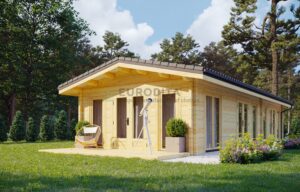By their name, mobile homes are designed to be movable. Although at first everything seems to be self explanatory, there are some genuine legislative information to be aware of, especially if you are in the United Kingdom. The set of laws we would like to cover in this post is the Caravan Act. This piece of legislation defines what constituted a mobile home and when can such a building be moved.
To put it very basically, a caravan – or in this case a mobile home – is a structure that is adapted for human habitation, which also can be moved once separated into 2 sections. To put it in an even simpler way, if a building is attached to the ground and can’t be moved, it cannot be considered a caravan.
You might be wondering why is this important. The key reason is that The Caravan Act relaxes requirements concerning building planning. For example, if you’re building an extension to you’re building an extension to your brick garden shed, you will require a Planning Permission. However, if you will be buying a custom mobile home like Wills from our catalogue, under the Caravan Act, you will not require such a permit.
What constitutes a mobile home?

Under the Caravan Act, only very specific structures can be considered a mobile home. While the very first Caravan Act was passed in 1968, it was amended in 2006, and later in 2007 in Wales. Section 29 detailed which structures could be defined as caravan, and in our case – a mobile home.
- Length (minus the drawbar) 20 m
- Width 6.8 m
- Overall height (rom the floor at its lowest to the ceiling at its highest) 3.05 m
Another set of guidelines describe what characteristics of the mobile home have to be present in order to be considered a caravan:
- It must be a structure, not a building;
- It must be fit for human habitation;
- It must be possible to relocate the structure, including around its site, when assembled.
Our own selection of mobile homes

All mobile homes on our catalogue comply with the Caravan Act. They are sized accordingly. They can be transported while split in half, as many times as needed. They can be easily moved within their location and to another destination altogether. Eurodita produces bespoke mobile homes that are easy to assemble and are high in timber quality. Naturally, they do not require concrete foundation or any other preparation.
We have a wide range of sizes. From small, single bedroom mobile homes like Trent, to large 4 bedroom comfort picks like Thames. Even this large model can easily transported, constructed and moved to any location necessary.
What to watch out for?
Although we at Eurodita will be sure that our custom mobile homes will surely adhere to the Caravan Act, we always recommend checking with your chosen supplier. Clients that buy mobile homes, only to discover later that they don’t comply with the legislation, face heavy fines. More than that, you will likely be forced to demolish the structure. Make sure that the mobile home you’re selling or buying surely complies with these standards.
The Caravan Act is a truly comprehensive set of rules regarding mobile homes. It makes the process of building comfortable, easy structures without much hassle. And if proven unfit, the structures can also be moved with ease to a more suitable location. It’s a win-win situation for the owner and the government. We are happy to consult our partners in regards to the compliance to the Caravan Act, especially when it comes to custom orders. Don’t hesitate to reach out to us via our partner program!
